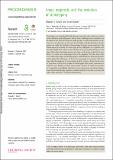Files in this item
Group reciprocity and the evolution of stereotyping
Item metadata
| dc.contributor.author | Stewart, Alexander J. | |
| dc.contributor.author | Raihani, Nichola | |
| dc.date.accessioned | 2023-01-30T12:35:36Z | |
| dc.date.available | 2023-01-30T12:35:36Z | |
| dc.date.issued | 2023-01-25 | |
| dc.identifier | 282412761 | |
| dc.identifier | 00c1c0b4-2340-4cdc-83f7-92548ff884e8 | |
| dc.identifier | 000914748200001 | |
| dc.identifier | 85146404054 | |
| dc.identifier.citation | Stewart , A J & Raihani , N 2023 , ' Group reciprocity and the evolution of stereotyping ' , Proceedings of the Royal Society of London Series B: Biological Sciences , vol. 290 , no. 1991 , 20221834 . https://doi.org/10.1098/rspb.2022.1834 | en |
| dc.identifier.issn | 0962-8452 | |
| dc.identifier.other | ORCID: /0000-0001-5234-3871/work/128097792 | |
| dc.identifier.uri | https://hdl.handle.net/10023/26854 | |
| dc.description | Funding: A.J.S. is supported by the John Templeton Foundation for funding (grant no. 62281). N.R. is supported by the Royal Society and the Leverhulme Trust. | en |
| dc.description.abstract | Stereotypes are generalized beliefs about groups of people, which are used to make decisions and judgements about them. Although such heuristics can be useful when decisions must be made quickly, or when information is lacking, they can also serve as the basis for prejudice and discrimination. In this paper, we study the evolution of stereotypes through group reciprocity. We characterize the warmth of a stereotype as the willingness to cooperate with an individual based solely on the identity of the group they belong to. We show that when stereotype groups are large, such group reciprocity is less likely to evolve, and stereotypes tend to be negative. We also show that, even when stereotypes are broadly positive, individuals are often overly pessimistic about the willingness of those they stereotype to cooperate. We then show that the tendency for stereotyping itself to evolve is driven by the costs of cognition, so that more people are stereotyped with greater coarseness as costs increase. Finally we show that extrinsic ‘shocks’, in which the benefits of cooperation are suddenly reduced, can cause stereotype warmth and judgement bias to turn sharply negative, consistent with the view that economic and other crises are drivers of out-group animosity. | |
| dc.format.extent | 12 | |
| dc.format.extent | 673370 | |
| dc.language.iso | eng | |
| dc.relation.ispartof | Proceedings of the Royal Society of London Series B: Biological Sciences | en |
| dc.subject | Group reciprocity | en |
| dc.subject | Judgement bias | en |
| dc.subject | Cooperation | en |
| dc.subject | Sterotyping | en |
| dc.subject | Game theory | en |
| dc.subject | Cultural evolution | en |
| dc.subject | QA Mathematics | en |
| dc.subject | NDAS | en |
| dc.subject | MCC | en |
| dc.subject.lcc | QA | en |
| dc.title | Group reciprocity and the evolution of stereotyping | en |
| dc.type | Journal article | en |
| dc.contributor.sponsor | John Templeton Foundation | en |
| dc.contributor.institution | University of St Andrews. Applied Mathematics | en |
| dc.identifier.doi | https://doi.org/10.1098/rspb.2022.1834 | |
| dc.description.status | Peer reviewed | en |
| dc.identifier.grantnumber | 62281 | en |
This item appears in the following Collection(s)
Items in the St Andrews Research Repository are protected by copyright, with all rights reserved, unless otherwise indicated.

